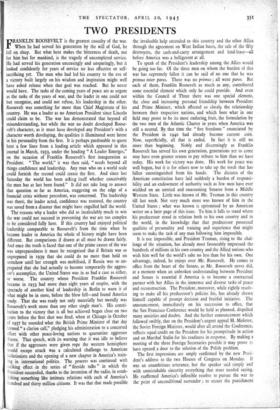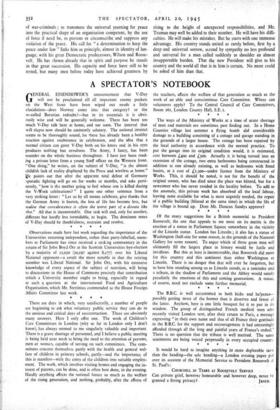TWO PRESIDENTS
FRANKLIN ROOSEVELT is the greatest casualty of the war. When he had served his generation by the will of God, he fell on sleep. But what here makes the bitterness of death, not for him but for mankind, is the tragedy of uncompleted service. He had served his generation unceasingly and unsparingly, but it looked confidently for years of service no less effective or self- sacrificing yet. The man who had led his country to the eve of a victory built largely on his wisdom and inspiration might well have asked release when that goal was reached. But he never would have. The tasks of the coming years of peace are as urgent as the tasks of the years of war, and the leader in one could not but recognise, and could not refuse, his leadership in the other. Roosevelt was something far more than Chief Magistrate of his country. He was a leader as no American President since Lincoln could claim to be. The war has demonstrated that beyond all misunderstanding, but while the war no doubt developed Roose- velt's character, as it must have developed any President's with a character worth developing, the qualities it illuminated were latent in his personality from the first. It is perhaps pardonable to quote here a few lines from a leading article which appeared in this journal in March, 1933, under the heading " A Leader Emerges," on the occasion of Franklin Roosevelt's first inauguration as President. " The world," it was then said, " needs beyond all things confidence and leadership. Any man who on a world scale could furnish the second could create the first. And since last Saturday the world has been asking itself whether conceivably the man has at last been found." It did not take long to answer that question so far as America, staggering on the edge of a financial crisis without precedent, was concerned. The leadership was there, the leader acted, confidence was restored, the country was saved from a disaster that might have engulfed half the world.
The reasons why a leader who did so incalculably much to win the war could not succeed in preventing the war are too complex to be considered fully here. If this country had enjoyed political leadership comparable to Roosevelt's from the time when he became leader in America the whole of history might have been different. But comparisons if drawn at all must be drawn fairly. And once the truth is faced that one of the prime causes of the war was unpreparedness it must be recognised that if Britain was so unprepared in 1939 that she could do no more than hold on somehow until her strength was mobilised, if Russia was so un- prepared that she had actually to become temporarily the aggres- sor's accomplice, the United States was in as bad a case as either, or worse. The country whose President Franklin Roosevelt became in 1933 had more than eight years of respite, with the spectacle of another kind of leadership in Berlin to warn it of what might be in store, before the blow fell—and found America ready. That she was ready not only materially but morally was Roosevelt's work more than any other single man's. His contri- bution to the victory that is all but achieved began close on two years before the first shot was fired, when at Chicago in October of 1937 he sounded what the British Prime Minister of that day termed_" a clarion call," pledging his administration to a concerted effort with other peace-loving nations to quarantine aggressor States. That speech, with its warning that it was idle to believe that if the aggressors were given rope the western hemisphere would escape attack was a calculated challenge to American isolationists and the opening of a new chapter in America's train- ing in international politics. The process was continued with striking effect in the series of " fireside talks " in which the President succeeded, thanks to the invention of the radio, in estab- lishing something like intimate relations with each of America's hundred and thirty million citizens. It was that that made possible the invaluable help extended to this country and the other Allies through the agreement on West Indian bases, the sale of the fifty destroyers, the cash-and-carry arrangement and lend-lease—all before America was a belligerent at all.
To speak of the President's leadership among the Allies would be going too far. Of the three men on whom the burden of this war has supremely fallen it can be said of no one that he was primus inter pares. There was no primus ; all were pares. But each of them, Franklin Roosevelt as much as any, contributed some essential element which only he could provide. And even within the Council of Three there was one special element, the close and increasing personal friendship between President and Prime Minister, which affected so closely the relationship between their respective nations, and which bore what in one field may prove to be its most enduring, fruit, the formulation by the two men of the Atlantic Charter in years when America was still a neutral. By that time the " five freedoms " enunciated by the President in 1940 had already become current coin.
Now, superficially, all that is ended. In fact it is still no more than beginning. Nobly and discerningly as Franklin Roosevelt has served his own generation, generations yet to come may have even greater reason to pay tribute to him than we have today. His work for victory was done. His work for peace was well begun, but it is for others now to take up the torch that has fallen unextinguished from his hands. The dictates of the American constitution have laid suddenly a burden of responsi- bility and an endowment of authority such as few men have ever wielded on an untried and unassuming Senator from a Middle Western State. Little was .known of Mr. Truman in this country till last week. Not very much more was known of him in the United States ; what was known is epitomised by an American writer on a later page of this issue. To him it falls to stand where his predecessor stood in relation both to his own country and to the world, in the knowledge that that predecessor possessed qualities of personality and training and experience that might seem to make the task of any man following him impossible.
It is not impossible, and President Truman, rising to the chal- lenge of the situation, has already most favourably impressed the hundreds of millions in his own country and the Allied nations who wish him well for the world's sake no less than for his own. One advantage, indeed, he enjoys over Mr. Roosevelt. He comes to office from the heart of the Senate, as Mr. Roosevelt never did, at a moment when an unbroken understanding between President and Senate is essential if America is to become a contractual partner with her Allies in the immense and diverse tasks- of peace and reconstruction. The President, moreover, while rightly resolv- ing to make all his predecessor's policies his, has already shown himself capable of prompt decision and fruitful initiative. The announcement, immcdiately on his succession to office, that the San Francisco Conference would be held as planned, dispelled many anxieties and doubts. And the further announcement which followed swiftly, that on the President's urgent appeal M. Molotov, the Soviet Foreign Minister, would after all attend the Conference, reflects equal credit on the President for his promptitude in action and on Marshal Stalin for his readiness in response. By making a meeting of the three Foreign Secretaries possible it may prove to have opened a door to the solution of the Polish problem.
The first impressions are amply confirmed by the new Presi- dent's address to the two Houses of Congress on Monday. It was an unambitious utterance, but the speaker said simply and with unmistakable sincerity everything that most needed saying. He reaffirmed America's inflexible resolve to pursue the war to the' point of unconditional surrender ; to secure the punishment of war-criminals ; to transmute the universal yearning for peace into the practical shape of an organisation competent, by the use of force if need be, to prevent or circumscribe and suppress any violation of the peace. His call for " a determination to keep the peace under law " links him in principle, almost in identity of lan- guage, with his great Democratic predecessors, Wilson and Roose- velt. He. has Fhown already that in spirit and purpose he stands in that great succession. His capacity and force have still to be tested, but many men before today have achieved greatness by rising to the height of unexpected responsibilities, and Mr. Truman may well be added to their number. He will have his diffi- culties. He will make his mistakes. But he starts with one immense advantage. His country stands united as rarely before, first by a deep 'and universal sorrow, second by sympathy no less profound and universal for a man called suddenly to shoulder an almost insupportable burden. That the new President will give to his country and the world all that is in him is certain. No more could be asked of him than that.



























 Previous page
Previous page